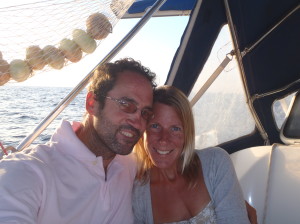 When Matthew Dunstan* left his secure job at Microsoft to sail around the world with his wife and two young sons, he didn’t expect it to change his views on life. Or maybe he did. It turns out that the old adage is true: a rising tide really does raise all ships. Matthew learned a thing or two about generosity. He also learned a lot about how to successfully run a business. These are his lessons for creating abundance in worklife – and how to chart a new course on your own.
When Matthew Dunstan* left his secure job at Microsoft to sail around the world with his wife and two young sons, he didn’t expect it to change his views on life. Or maybe he did. It turns out that the old adage is true: a rising tide really does raise all ships. Matthew learned a thing or two about generosity. He also learned a lot about how to successfully run a business. These are his lessons for creating abundance in worklife – and how to chart a new course on your own.
Matthew is back home in Australia now, but in 2010 he took an extended sabbatical and spent two years on a break from his career. He always had big life goals to cruise to tropical shores, but sailing across the ocean was something he and his wife decided was something that they would also undertake. Matthew resigned from his job, rented his house, and put his cars in storage. He and his wife home-schooled (ship-schooled?) their boys – then ages 7 and 8 – on board their boat.
Leaving a known-life for a life at sea with your family is certainly ripe for immense lessons, but one that Matthew found most powerful was based on his experiences of generosity. He had grown up in a business environment – which is all about exchange, give-to-get, and the transactions of our commercial society. But in his sea-faring existence, Matthew found example-after-example of people who did nice things for others for the sake of it. They provided good for the good of it. They weren’t offering help with an expectation of exchange, instead, they were simply being generous. Because this is so far outside our typical approach in the business world, it took Matthew 6 months to get used to this new dynamic – to simply accept their generosity at face value.
The lesson has changed his relationship with money and with the market. If you want to earn more money, he says, you need to find a way to serve more people and create more value in the world. Likewise, if you’re not creating value, money shouldn’t be flowing your way, says Matthew. When profit isn’t your first objective, it changes your relationship with your business, with other people, and with yourself. Matthew’s business is called Rising Tide Ventures in which he seeks to support solopreneurs and empower their journeys through education, knowledge, and support.
As an expert in entrepreneurialism and solopreneurs, Matthew knows that work life is uniquely challenging when you own your own business. A lot of people open their own businesses or hang out their own shingles with the intention of enhancing their work-life. They may expect more flexibility or less intensity of working hours. But the opposite is actually the case. When it’s your own business, you think about it 24/7, and it’s difficult to turn off. There is intense pressure to perform. Every business has natural up and down cycles, but for the entrepreneur, these frequently feel like a reflection on themselves – and they may or may not actually be mirrors of performance.
Matthew has a few suggestions for success:
- Write down how you spend your time and use the log to discern busy time from important time. 80% of time spent should be invested in producing revenue.
- Work on the important stuff – the ‘big rocks’, Matthew calls them.
- Avoid spending too much time in your home office. Get out into your market.
- Get advice from experts. It is a mistake to think you can do everything brilliantly. You will naturally have strengths and areas that are less strong. Get help in the places where you don’t personally excel.
- Obtain objective input. Sometimes when you’re too close to something it’s hard to see the forest for the trees. Matthew recommends obtaining objective points of view to ensure a clear view.
- Have a disciplined approach to marketing and sales. “At the end of the day,” Matthew says, “more customers and more sales solve a lot of other problems.” Concentrate on demand generation and a lot of other problems naturally go away.
How do you know if it’s the right time to go out on your own? From an emotional point of view, it’s when you’re crazy compelled to do so and if you’ve found something that sets your heart on fire, says Matthew. When your enthusiasm overtakes you, that is the time to consider your own venture.
From a rational point of view, it makes sense to prepare as much as you can in advance. Invest all you can in the infrastructure you’ll need while you’re still working. If you can’t afford to invest while you do have an income, you’ll never be able to invest when you are first starting out. Do your branding, your website, your business cards, and other ramp-up activities behind the scenes before you leave your job, Matthew suggests. Do these things really well so that the look and feel of your business is brilliant from the beginning and not dodgy or clunky. Doing these well will impact on the perception of your value and will help you win more customers.
Matthew also suggests doing market research before you’ve invested in development. Ask people early on what they think of your idea and whether they see a need and would buy your product or service. Obtain this feedback before you’ve put too much of your heart or soul or money into the particular product you’re considering.
So what does it take to be successful as an entrepreneur? Matthew says it’s a lot about commitment and fortitude. It won’t all be smooth sailing and you must have the ability to pick yourself up, square your shoulders, and put something behind you to keep going. It doesn’t matter how successful you are, there will always be hard days that you’ll have to get through. This is also a benefit for children. When children see us try and fail and pick ourselves up, they learn important lessons about perseverance, persistence, and the ingredients of success.
How has Matthew personally learned to integrate work and life? By setting boundaries. For example, in his home, there are no screens after 6pm and his wife and his boys (now 13 and 14) all adhere to the guideline.
A few years ago, Matthew also wrote his own eulogy. The exercise was a powerful process to reflect on and commit to his life goals. He keeps work in perspective. He says he loves what he’s doing but the business will evolve and it won’t be around in 20 years as it is today. On the other hand, his family will be around forever. They are the long play and he will protect his time with them. He finds ways to create value and serve in his business life – and even more so in his personal life. The rising tide he is creating raises all boats, especially those of his family.
*Matthew is the founder of Rising Tide Ventures and the author of The Co-Working Revolution: Four Secrets to Successfully Working for Yourself. He lives in Australia and sails as often as he gets the chance.
 Would you like to tell your story? If so, let me know by emailing me at tbrower108@gmail.com. Why? One of the foundations of Bringing Work to Life is abundance: the idea that it is possible to find fulfillment, have it all, and avoid the trade-offs between work and life. After all, work and life aren’t separate things to be placed in containers, but part of an integrated whole of a satisfying life. Another foundation of Bringing Work to Life is the idea of multiple right answers. As we’re all seeking ways to bring work to life – and bring life to work – we can learn from each other’s unique solutions and stories. I’d love to learn about your story!
Would you like to tell your story? If so, let me know by emailing me at tbrower108@gmail.com. Why? One of the foundations of Bringing Work to Life is abundance: the idea that it is possible to find fulfillment, have it all, and avoid the trade-offs between work and life. After all, work and life aren’t separate things to be placed in containers, but part of an integrated whole of a satisfying life. Another foundation of Bringing Work to Life is the idea of multiple right answers. As we’re all seeking ways to bring work to life – and bring life to work – we can learn from each other’s unique solutions and stories. I’d love to learn about your story!
Tracy Brower is the author of Bring Work to Life by Bringing Life to Work: A Guide for Leaders and Organizations.
